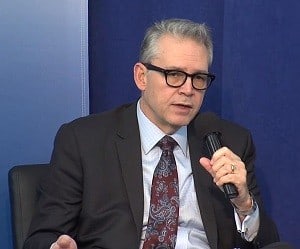UAMS’ Lowery Speaks at Brookings Institute
| Dec. 17, 2014 | Curtis Lowery, M.D., chairman of the Department of Obstetrics and Gynecology in the College of Medicine and director of maternal-fetal medicine at UAMS, recently participated on a panel discussing delivery of health care to rural communities at the Brookings Institution in Washington, D.C.
Brookings, a nationally respected, independent public policy think tank, held the session to discuss how telemedicine can be used to deliver specialized care to patients in rural areas rather than having to take patients to urban centers where the specialists are.
“UAMS and ANGELS, or Antenatal and Neonatal Guidelines, Education and Learning Systems, are pretty well known nationally as big projects that can serve as examples of this,” said Lowery. ANGELS uses telemedicine to deliver care across Arkansas to women with high-risk pregnancies.
The panel discussion also centered on the shift of health care from a fee-for-service model to one that serves as a comprehensive management system for patient care. The Brookings Institution will ultimately publish a consensus paper on the topics to guide policymakers.
The panel, moderated by Kavita Patel, M.D., managing director of clinical transformation and the Engelberg Center for Health Care Reform, also included Sanjeev Arora, M.D., executive director of Project ECHO, a network-based lifelong learning and guided practice model for medical education.
Much of the panel’s discussion focused on the role and impact of those who provide specialized care. Lowery said the reach of specialists can not only be extended to more patients through a technology-based network that connects them to primary providers, but the cost of providing care overall can be brought down once a managed care pay system is adopted.
“It’s simply a more efficient system,” he said. “Look at the whole world and ask who isn’t doing this. From banking to air transportation to Amazon, they’re using a technology-based network and it results in service at a lower cost.”
Arkansas has been particularly adept at pioneering this model, Lowery said, thanks to its largely rural nature and the tremendous, bipartisan political support it’s had in securing funding. |
